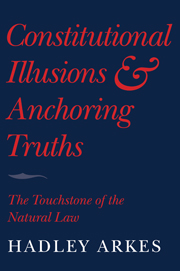Book contents
- Frontmatter
- Contents
- Acknowledgments
- INTRODUCTION: The Anchoring Common Sense and the Puzzles of the Law
- ONE On the Novelties of an Old Constitution: Settled Principles and Unsettling Surprises
- TWO The Natural Law – Again, Ever
- THREE Lochner and the Cast of Our Law
- FOUR The Strange Case of Prior Restraint: The Pentagon Papers
- FIVE Near Revisited
- SIX The Saga of Frank Snepp and the New Regime of Previous Restraints
- SEVEN And Yet…A Good Word on Behalf of the Legal Positivists
- EIGHT Conclusion and Afterword
- Index
- References
ONE - On the Novelties of an Old Constitution: Settled Principles and Unsettling Surprises
Published online by Cambridge University Press: 05 June 2012
- Frontmatter
- Contents
- Acknowledgments
- INTRODUCTION: The Anchoring Common Sense and the Puzzles of the Law
- ONE On the Novelties of an Old Constitution: Settled Principles and Unsettling Surprises
- TWO The Natural Law – Again, Ever
- THREE Lochner and the Cast of Our Law
- FOUR The Strange Case of Prior Restraint: The Pentagon Papers
- FIVE Near Revisited
- SIX The Saga of Frank Snepp and the New Regime of Previous Restraints
- SEVEN And Yet…A Good Word on Behalf of the Legal Positivists
- EIGHT Conclusion and Afterword
- Index
- References
Summary
There was a moment, in Evelyn Waugh's Brideshead Revisited, when the young, reflective, eccentric Lord Brideshead pondered aloud over the chapel attached to the family castle. Young Brideshead turned, in his thoughts, to the quality of the chapel as a work of architecture, and he took advantage of the presence of Charles Ryder, who was a student of art. “You are an artist, Ryder,” he said, “what do you think of [the chapel] aesthetically.… Is it Good Art?”
“Well, I don't quite know what you mean,” said Ryder. “I think it's quite a good example of its period. Probably in eighty years it will be greatly admired.”
“But surely,” said Brideshead, in the voice of Aristotle or Kant, “surely it can't be good twenty years ago, and good in eighty years, and not good now?”
Ryder spoke with the convictions of the modern historicist: He would not claim to speak about the things that are “good” or “bad” outside that epoch in which he lived and cast his judgments. Judgments of right and wrong, in aesthetics as well as politics, were always “relative,” in this view, to the place and the time. He would not speak across historical epochs and pronounce on the goodness or badness of the buildings that were built in ancient Athens or in Paris at the turn of the century. He would not speak, that is, about any things that might be enduringly good.
- Type
- Chapter
- Information
- Constitutional Illusions and Anchoring TruthsThe Touchstone of the Natural Law, pp. 13 - 42Publisher: Cambridge University PressPrint publication year: 2010

